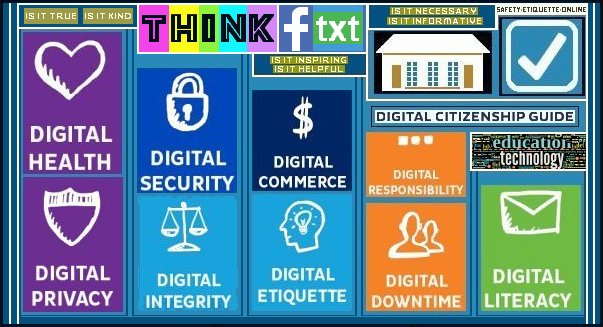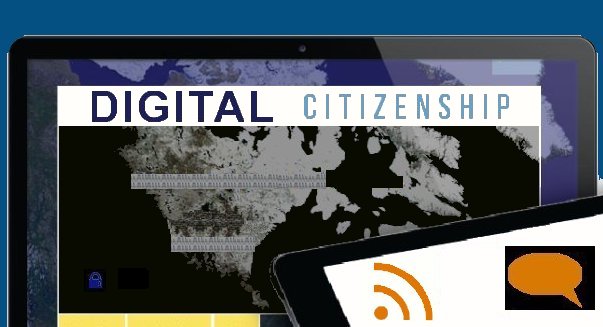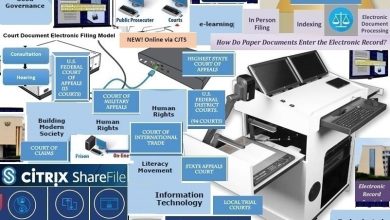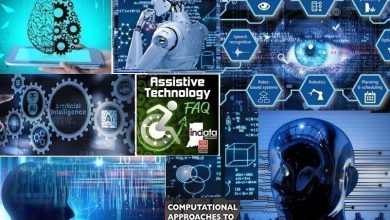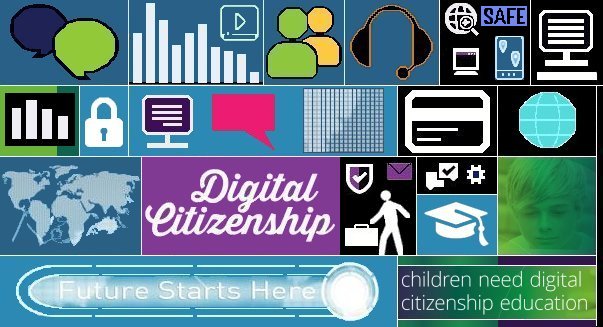
The online world is as real as social experiences in any community and difficult to separate from the real world; even grocery shopping has become an online activity. According to the Turkish Online Journal of Educational Technology (TOJET) we live in an era known as the digital age. Since we are considered citizens of the community we live in, and users of the internet, we are also integrated citizens of the digital world we learn, live, and work in. We might not realise it, but in the current century we have become citizens of a digital nation. The term digital citizenship comes from the idea that computer users are inhabitants, or ‘citizens’ of the digital society, and thus have a responsibility towards the community when using technology. Digital citizenship is a combination of social and technological skills that enable people to be safe and successful in the information age. In a world where information is readily available (but challenging to evaluate) we are persistently exposed to counterfeit online content and ill-equipped to engage in the social space. Since education is at the heart of society, schools are liable to teach digital citizenship and digital literacy.
The Society for Information Technology and Teacher Education (SITE) is an international, academic association of collaborative organisations, researchers, and teaching educators in various disciplines. SITE uses books, conferences, and collaborative projects to promote professional knowledge obtained through practice, theory, and research. The Journal of Technology and Teacher Education (JTATE) serves as teacher education platform for the exchange of knowledge in information technology. The CITE Journal (Contemporary Issues in Technology and Teacher Education) is SITE’s equivalent to JTATE which consists of online collaboration between five professional teacher associations in the disciplines of English language arts, instructional technology, mathematics, science, and social studies. The International Council for Computers in Education (ICCE) was founded in 1979 and the Association for the Advancement of Computing in Education (AACE) was founded in 1981. AACE is an international, educational, and professional organisation dedicated to the learning and teaching (at all levels) of the development of knowledge, quality, and theory of information technology. During 1989, ICCE’s name was changed to ISTE (the International Society for Technology in Education); although the name change was in 1989, ISTE was actually founded during 1990. ISTE is the foremost global professional organisation with the goal of ‘the integration of educational technology.’ Their objective is to create technology standards for administrators, students, and teachers, to coach them to successfully develop technology skills in education, and to provide them with guiding tools to integrate technology into teaching sessions. ISTE defines digital citizenship as a student’s ability to ‘recognise the rights, responsibilities, and opportunities of living, learning and working in an interconnected digital world, and to act and model in ways that are safe, legal and ethical.’ This concept must not be confused with digital literacy; although, with the development of the Internet of Things the two concepts have become entangled. ISTE has honoured their goal by introducing various methods that qualify as educational technology. Mike Ribble and Gerard Bailey’s ISTE publication ‘Digital Citizenship in Schools’ allows students to practice ethical and legal behaviour; the book guides students through real-world scenarios related to digital literacy and safety with the objective of teaching students how technology can influence culture and society. ICOT is ISTE’s Classroom Observation Tool; a free online resource to guide teachers, administrators, and other educators. CCSS is the Common Core State Standards- endorsed teaching; ISTE’s provision to construct a teacher practice network centred on integrating technology into literacy and mathematics tuition. NETS is the National Educational Technology Standards (first introduced by ISTE during 1998); the project is a progressive course of action.
Two most important concepts regarding digital citizenship are digital literacy and digital law. Digital literacy standards require critical thinking and consideration of the messages we create and receive through various forms of communication. A digitally literate person has the skills to holistically and positively engage with digital technology and knows how to use embedded resources such as links and videos. Digital law (the most important aspect of digital citizenship) is the ethical use of all activities on the internet that is accepted by the laws of society and defines what a digital citizen is ethically allowed to do while using the internet; it is to acknowledge electronic responsibility for one’s actions and deeds. Breaking the ethical code is examples such as copyright infringements, online identity theft, and to create viruses. The digital citizenship guide constructs an all-inclusive framework that teaches nine fundamental principles of how to be a digital citizen who uses technology legally, responsibly, and safely.
Ever since the beginning of the pandemic, digital citizenship has been the limelight of educational discussions. When the pandemic forced educators to modify their teaching methods from classroom sessions to distance learning, teachers had no other option than to exploit online technologies for student development and education; every student now needs to use the internet. During 2019, the Computer Science Teachers Association (CSTA), in partnership with ISTE, launched an effort to revise the Standards for computer science educators. With the arrival of social media, the concept of using technology resources in an appropriate manner (ranging from etiquette and communication skills to copyright issues and the legal implications of one’s actions) raised concern for today’s youth and their online safety. Today’s students face various difficulties that previous generations never encountered such as cyber bullying, cybercrime, internet addiction, online privacy concerns, and social media. With students spending more time in the digital world; they need help in making digital security a priority and guidance on ‘best practice’ when on the internet. The issue of cyber bullying and its negative effects (which can have serious consequences) is due to not having ample knowledge of digital citizenship. To help students manage their digital lives, to enjoy the benefits of internet, and to prevent cyber bullying it is important to assist them in understanding digital health and wellness. As we teach children to behave respectfully and responsibly in public, they should also behave on the internet; although, teaching digital citizenship is more than merely following rules and procedures. Digital citizenship includes every aspect of a child’s online world such as gaming, social media, schoolwork, and texting. Students need skills to protect themselves in order to positively and confidently engage with digital technology; therefore, digital citizenship education should include mentored experiences to help them practice creative, deliberate, and positive use of the internet. It ensures that students think critically, behave safely, and participate responsibly. There is an online game that teaches younger children how to evaluate online content, internet safety, and ‘netiquette.’
With the increase of electronically stored private information, it has become necessary to guarantee its safety. Digital citizenship is regulated by a set of technological behaviours that applies to every person who is connected to a digital device (a computer, a mobile device, the internet, or any other digital gadget that is able to connect to society and the world). Digital citizens are accountable for their actions and behaviours towards others while using digital technology. All digital citizens have civil rights; therefore, the standard of technological ethical behaviour requires them to exercise and defend their online democratic rights and responsibilities. People who consider themselves responsible digital citizens have the knowledge and skills to safely use digital technology and digital content. Because they understand their rights and responsibilities, recognise the benefits and risks, and realise the personal and ethical repercussions of their actions, they use applications, blogs, comments, communities, online forums, social media, and websites to actively engage with a digital community and to contribute towards society. An admirable digital citizen has a positive self-image about netiquette and digital citizenship. He identifies with digital citizenship concepts and makes informed decisions to manage his online personal information, learns appropriate digital communication, digital rights and responsibilities, digital security, digital etiquette, digital law to ensure safety, practices positive interaction on social media (avoids the overuse of social media), actively strives to broaden his knowledge (constantly uses the internet for research purposes), communicates clearly, respectfully, and with empathy, treats others courteously (never bullies), does not damage others’ property or person, and supports equal human rights for all. International online journals in technology give digital citizens a platform to expose their knowledge and research to a wide audience. The International Journal of Technology in Education and Science (IJT ES) is a peer-reviewed scholarly online journal. The International Journal of Educational Technology (IJET) is the online, academic journal that adheres to the utmost standards of peer review and appoints established and upcoming scholars from anywhere in the world. IJTE is an international journal that accommodates any research papers on educational technology such as articles, literature, as well as reviews and reports from books.
Digital citizenship is all about enjoying the benefits of the digital world and upholding a positive identity within this world. Our digital presence leaves a digital footprint (online as well as offline). The main benefit of digital citizenship is to use technology to encourage healthy online communities and to have access to Internet and Communication Technologies (ICTs) to support democracy, human rights, equal opportunities, and technology skills. It is believed that a student who has been taught to develop a strong sense of digital citizenship is equipped with the knowledge, resources, and skills to not only confidently and responsibly engage within a digital environment, but has also developed skills that assist him throughout his career. Such a student possesses the leadership qualities to have a significant impact on the lives of others!



